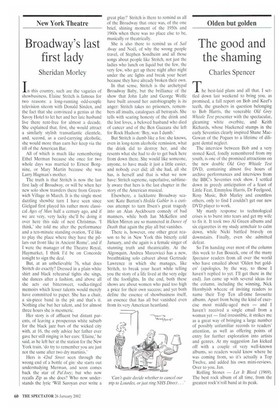New York Theatre
Broadway's last first lady
Sheridan Morley
In this country, such are the vagaries of showbusiness, Elaine Stritch is famous for two reasons: a long-running odd-couple television sitcom with Donald Sinden, and the fact that she convinced a genius at the Savoy Hotel to let her and her late husband live there rent-free for almost a decade. She explained that, first, she would attract a similarly stylish transatlantic clientele, and, second, as a card-carrying alcoholic, she would more than earn her keep via the till of the American Bar.
All of which is much like remembering Ethel Merman because she once for two whole days was married to Ernest Borgnine, or Mary Martin because she was Larry Hagman's mother.
The truth is that Stritch is now the last first lady of Broadway, or will be when her new solo show transfers there from Greenwich Village in March. It is the single most dazzling showbiz turn I have seen since Gielgud first played his rather more classical Ages of Man half a century ago, and if we are very, very lucky she'll be doing it over here this side of next Christmas. 'I think,' she told me after the performance and a ten-minute standing ovation, 'I'd like to play the place where they have the pillars out front like in Ancient Rome', and if I were the manager of the Theatre Royal, Haymarket, I think I'd be on Concorde tonight to sign the deal.
But, at an unbelievable 76, what does Stritch do exactly? Dressed in a plain white shirt and black rehearsal tights she sings, she dances after a fashion, and above all she acts out bittersweet, vodka-tinged memoirs which lesser talents would merely have committed to paper. She has a chair, a six-piece band in the pit and that's it. Nothing else but her talent, and for almost three hours she is mesmeric.
Her story is of affluent but distant parents, of leaving a prosperous white suburb for the black jazz bars of the wicked city with, at 16, the only advice her father ever gave her still ringing in her ears: 'Elaine,' he said, as he left her at the station for the New York train, 'do try to remember you are just not the same after two dry martinis.'
Hers is 42nd Street seen through the wrong end of a bottle of gin: she starts out understudying Merman, and soon comes back the star of Pal Joey; but who now recalls Zip as she does? Who now understands the lyric 'Will Saroyan ever write a great play?' Stritch is there to remind us all of the Broadway that once was, of the one brief, shining moment of the 1950s and 1960s when there was no place else to be, musically or theatrically.
She is also there to remind us of Sail Away and Noel, of why the wrong people travel, of Stephen Sondheirri and all those songs about people like Stritch, not just the ladies who lunch on liquid but the few, the very few, who get up there night after night under the arc lights and break your heart because they have already broken their own.
In that sense, Stritch is the archetypal Broadway Baby, but the brilliance of the show that John Lahr and George Wolfe have built around her autobiography is its anger: Stritch takes no prisoners, remembers all insults, catalogues all betrayals. She tells with searing honesty of the drink and the lost loves, a beloved husband who died of cancer and of the Ben Gazzara she left for Rock Hudson: 'Boy, was I dumb.'
But Stritch is dumb like a fox: she knows, even in long-term alcoholic remission, what the drink did to destroy her, and she resents what she had to do to get back here from down there. She would like someone, anyone, to have made it just a little easier, and nobody ever did; all she had, all she has, is herself and that is what we now have: Stritch supreme, superlative, sublimely aware that hers is the last chapter in the story of the American musical.
Elsewhere, a lacklustre Broadway season: Kate Burton's Hedda Gabler is a curious attempt to turn Ibsen's great tragedy into an Alan Ayckbourn comedy of bad manners, while both Ian McKellen and Helen Mirren are so mannered in Dance of Death that again the play all but vanishes.
There is, however, one other great reason to be in New York this bitterly cold January, and she again is a female singer of stunning truth and theatricality. At the Algonquin, Andrea Marcovicci has a new, breathtaking solo cabaret about Gertrude Lawrence in which she manages, like Stritch, to break your heart while telling you the story of a life lived at the very edge of the footlights. In the end, both these shows are about women who paid too high a price for their own success; and yet both define the essence of showbusiness itself, an essence that has all but vanished even from its very American heartland.


















































































 Previous page
Previous page